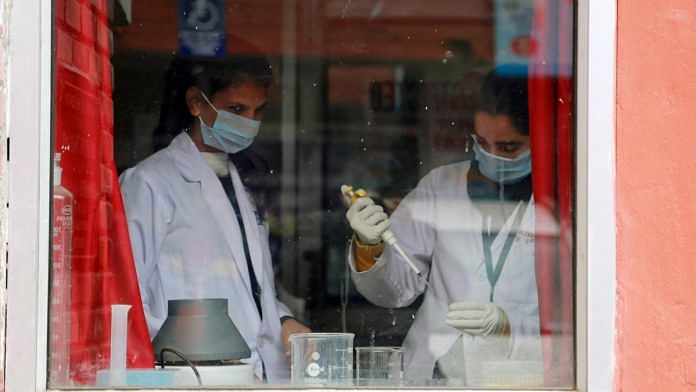New Delhi: More than 5 lakh people across the world have now contracted the novel coronavirus and over 24,000 have lost their lives so far. India reported over 700 cases and 17 deaths as of Friday.
While many nations have complained about shortage of medical equipment, scientists and innovators are racing to find a cure or alternative ways to battle the disease.
ThePrint brings you the top developments that have been taking place around the globe.
Turning snorkelling masks into protective gear
Indian-origin Stanford researcher Manu Prakash and his team have repurposed full-face snorkel masks with a 3D-printed N95 filter attachment as a reusable protective gear for healthcare workers.
The attachment could help address the worldwide shortage of N95 masks that are used to protect those who work closely with Covid-19 patients from catching the infection.
The team has made its design available through a document for experts around the world to use the concept.
Also read: These 5 anti-viral drugs and therapies could help treat COVID-19
Lockdown improves UK air quality
Air pollution levels in some cities in the UK have dropped to levels lower than the average of the previous five years as the coronavirus pandemic disrupts travel and work.
Scientists from the University of York have processed data from roadside monitoring sites in York, Birmingham, Glasgow, London and Manchester to reveal the significant reduction.
While air quality may not be a primary concern during a global pandemic, experiences of the global lockdown may inform the larger fight against pollution in the long run.
Data from China and Italy has also shown similar dips in air pollution during the lockdowns.
Racist attacks spike in US
While reports of racist attacks against Asians and African Americans have grown since the outbreak of the novel coronavirus, researchers have now found that these incidents may just be the tip of an iceberg.
A study of 6,238 adults in the US, conducted by social scientists at the University of Southern California, have found that Asian and African Americans experienced at least one form of discrimination and unfair treatment due to other people thinking they might have the coronavirus.
Apart from usual discrimination that persists in the US, the findings have shown, a new form of intolerance and maltreatment resulting from fear of infection is now increasing at an alarming level.
Also read: Research in China finds anti-viral drug Favipiravir effective in treating coronavirus
Antibodies of Covid-19 patients can shed light on immunity
Researchers at the Harvard Medical School and at Brigham and Women’s Hospital in the US are using an antibody-detection tool called VirScan to study the aftermath of the novel coronavirus infection.
VirScan detects antibodies in people’s blood that indicate active and past infections by viruses and bacteria.
Since it takes five to 10 days for a person to develop antibodies, VirScan will not be used to provide real-time diagnoses of infection with SARS-CoV-2.
However, it would analyse blood samples of people who recover from the infection to understand how the virus affects one’s immune system and the epidemiology of the disease.
The results could lead to better estimates of how lethal the virus is by capturing cases that may have gone undetected. The findings could also give new insights into the fundamentals of human immunity and could inform the development of vaccines against coronavirus.
Infected children often don’t show any symptom
A new study published in the Lancet has shown that a significant number of children may carry the Covid-19 infection without displaying any symptoms of the disease.
The research observations from 36 children in China reveal that nearly half of paediatric patients had no fever or cough. The findings are of concern because this makes identifying children with the infection difficult, which may lead to further spread of the disease among adults.
“Although all paediatric patients in our cohort had mild or moderate type of Covid-19, the large proportion of asymptomatic children indicates the difficulty in identifying paediatric patients who do not have clear epidemiological information, leading to a dangerous situation in community-acquired infections,” the study says.
Also read: India’s democracy deficit comes in the way of its battle against COVID-19



